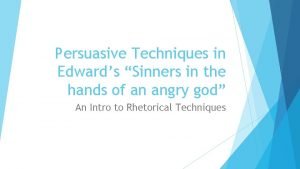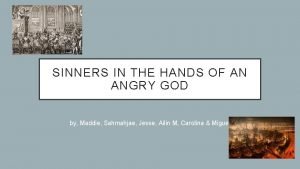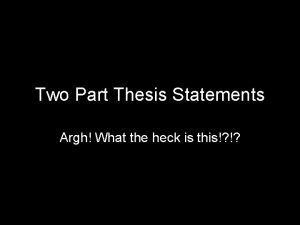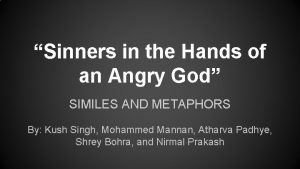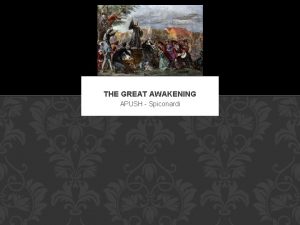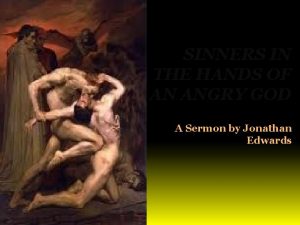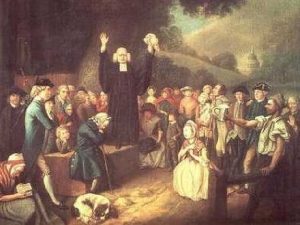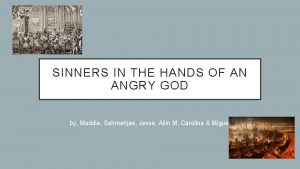Sinners in the Hands of an Angry God












- Slides: 12

Sinners in the Hands of an Angry God By Jonathan Edwards

Bell Starter: What is your greatest fear? Is there a reason you are afraid? By Jonathan Edwards Do your fears differ than the fears of the Puritans? Explain how?

Before We Read Remember the basic tenets of Puritanism? • The desire to have one’s feelings or life changed radically was an experience called grace. Grace involved a cleansing of the individual — a purging of sinfulness. Grace also entailed much self-examination as the Puritan sought signs that God was working within him & a key to understanding Edward’s point of view. • Predestination – a teaching that one’s salvation or damnation was Bythe. Jonathan decided by God at beginning of. Edwards time. • The Puritans were convinced that they were carrying on God’s work in settling in the New World. Their lives in the New World were a divine mission (very evident in William Bradford’s writing).

So what happened on July 8, 1781? Jonathan Edwards gave a sermon in Enfield, Connecticut Bythe Jonathan Puritans Edwards trembled they cried out for mercy some even fainted -AND 500 converted!

Let’s see what all the fuss was about… Please grab a piece of paper and some crayons or colored pencils. While you listen to the sermon, record images that you find striking. You may record these images using words By Jonathan Edwards and lines from the sermon, quick sketches, or a combination of the two. Make sure you pay close attention, there is more to do than just draw some pictures! When the sermon is done remain silent for 5 minutes, and finish your sketches and/or words.

Before we discuss… Open your textbooks to page 79, we will now listen and read the sermon one more time to identify: the purpose of the sermon, feelings of word choice, figures of speech, and the main idea. By Jonathan Edwards Answer the following questions on the back of your sheet of paper.

Before we discuss… 1. After reading the 1 st two paragraphs, what does Edwards hope his sermon will accomplish? 2. In the 2 nd paragraph what do the phrases “burning brimstone” and “hell’s wide gaping mouth” seek to arouse in the listener? 3. What type of figurative speech is used in the 3 rd paragraph, and what is the meaning? 4. What two types of figurative speech does Edwards use to Jonathan Edwards do you find more describe God’s. By wrath? What comparison frightening explain why? 5. After reading the 1 st column on page 81 what point about the listeners fate does Edwards want them to understand? 6. What two creatures does Edwards compare sinners to? Why did he choose these creatures? 7. How does Edwards use repetition to heighten the effect of his sermon?

Now let’s discuss… 1. What was stirring, striking, or memorable to you in reading this sermon? 2. Why do you think Edwards uses the images and analogies that he does? • Falling • Rock and spider’s web Edwards • Black clouds. By full. Jonathan of rain and thunder • Dammed waters ready to burst forth • Bow and arrow 3. What are the most prominent themes communicated by these images?

Now let’s discuss… 4. How are listeners meant to feel? 5. Come up with your own original image that conveys a predicament similar to the plight of the sinner that Edwards speaks of. 6. What is the purpose of his sermon? How are people meant to respond? Jonathan 7. How does this. By sermon work? Edwards What makes/made it effective?

Now let’s discuss… Below are listed a number of assumptions that Edwards’ congregants may have had about God and salvation. How does Edwards discount these ideas? • God doesn’t have the power to destroy me. • It wouldn’t be fair for me to be damned. • If God were really angry with me, then I would be in hell now. Since I’m alive By Jonathan Edwards now, then God must not be angry enough with me to condemn me. • I am young and healthy and in no danger, so I have no reason to expect to die. • But not me—I’m wise and careful to preserve my life, and other people are also looking out for me. • Even if I die, I’ll manage to escape hell. • God owes it to me to protect me. • I lead a good life and have had religious affections.

One last thing… Pair up with another student, get out one piece of paper, and do the following activity: Based upon your reading of "Sinner in the Hands of an Angry God, " by Jonathon Edwards, consider whether the following statements are true or false about Puritan theology. Then, write down a passage from the sermon upon which your opinion is based. By Jonathan Edwards 1. 2. 3. 4. 5. 6. Good works will get you salvation. True / False Everything in nature is pure and blessed. True / False A baby is considered innocent and sinless. True / False God is a loving God. True / False Man has dominion over the natural world. True / False Prayer and biblical study will help one to become blessed and saved. True / False

Before we discuss… On the back of your lines and pictures create three columns. Label the columns: Nature, the Divine, and the Individual. Categorize your lines and/or sketches into the three categories… By Jonathan Edwards What do these categories mean? • Nature refers to things that naturally occur in the world. For example: an animal, the sun, etc. • The Divine refers to God, heaven, etc. • The Individual refers to anything that can be contained within a person.
 Alliteration in sinners in the hands of an angry god
Alliteration in sinners in the hands of an angry god Sinners in the hands of an angry god persuasive techniques
Sinners in the hands of an angry god persuasive techniques Old lights apush definition
Old lights apush definition Sinners in the hands of an angry god summary
Sinners in the hands of an angry god summary Repetition in sinners in the hands of an angry god
Repetition in sinners in the hands of an angry god Two part thesis statement
Two part thesis statement 5 similes in sinners in the hands of an angry god
5 similes in sinners in the hands of an angry god Symbolism in sinners in the hands of an angry god
Symbolism in sinners in the hands of an angry god 1st great awakening apush
1st great awakening apush Imagery used in sinners in the hands of an angry god
Imagery used in sinners in the hands of an angry god Author's purpose of sinners in the hands of an angry god
Author's purpose of sinners in the hands of an angry god Hands on hips
Hands on hips Hebrew 10:31
Hebrew 10:31

